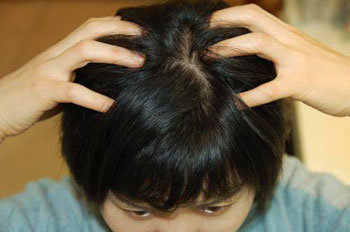How to Treat Dandruff

Are you suffering from an itching sensation on your head? Are you afraid of wearing dark clothing because of white flakes? Here are some tips to ward off obnoxious dandruff.
○ Washing your hair every other day prevents dry dandruff
Dry dandruff is small, white flake that affects the entire scalp. It is so dry and light that whenever you move it falls from your scalp and falls on your shoulders. Dry dandruff is also itchy.
If your scalp is too dry, you are highly likely to suffer from dry dandruff. Insufficiently rinsing ones hair after shampooing also leads to white flaking. Lack of sebum in the scalp due to frequent hair washing and an irritated scalp caused by soap residue can also result in excessive shedding of dead cells. Frequent use of a hair dryer and hair spray causes dry dandruff, as well.
Basic treatment for dry dandruff is to maintain proper moisture in your scalp. Washing your hair every two or three days is recommended, but avoid hot water.
Neither hair dryers nor dyeing is recommended. When dyeing solution, which contains various chemicals, is directly administered to the scalp, it irritates skin pores.
Hairpacking once or twice a week is another way to keep the scalp healthy. Applying baby oil in the scalp before going to bed significantly reduces dandruff.
○ Avoid rinsing if you have oily dandruff
Unlike dry scurf, oily and sticky dandruff is caused by excessive secretion of sebum.
If you have oily dandruff, avoid warming your scalp, which aggravates the symptom. Dont wear hats nor use hair dryers. Hair cream and essence are not recommended.
Wash your hair twice a day, in the morning and evening, using a shampoo for oily hair. But dont use shampoos that are mixed with rinses. It is better not to apply hair treatment. If you want to keep your hair soft, apply a few drops of lemon oil when rinsing. Lemons mild acid will make your hair silky. After shampooing, never forget to dry your hair completely.
○ Dandruff related to skin disorders treatable with medicine
Dermatitis also causes scurf. A common form of skin trouble that leads to excessive dead cells is seborrhoic dermatitis. The scalp is frequently affected by seborrhoic dermatitis but it also occurs where sebaceous glands aggregate, such as eyebrows, ears, nose and mouth.
Seborrhoic dermatitis in the scalp develops redness and itching along with white flakes. In worst cases, flakes become hardened, ooze and stink.
To treat seborrhoic dermatitis, in particular when it develops infection, take medication and use medicinal shampoos regularly. Avoid scratching your scalp with your fingers.
Dandruff is also associated with excessive secretion of male hormone, metabolism disorders, unstable automotive nerve, according to medical experts.
Dandruff is likely to accompany dermatitis and result in hair loss, said Choi Jeong-hwan, president of CNP Hair Clinic. Rather than washing hair frequently, finding out the root cause is necessary.
nuk@donga.com







